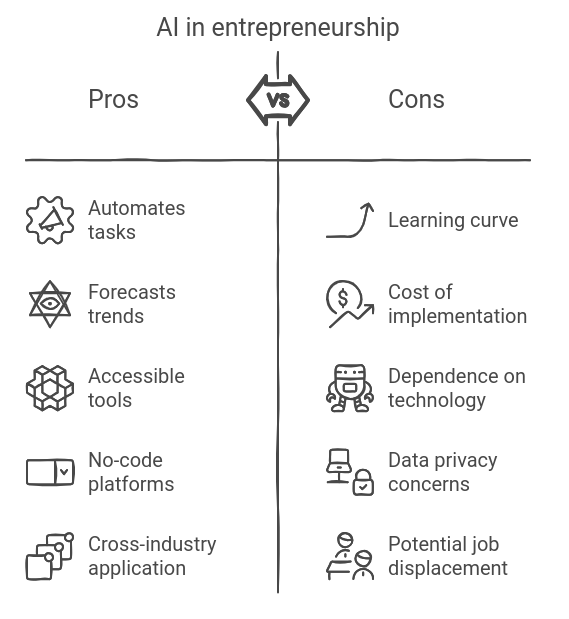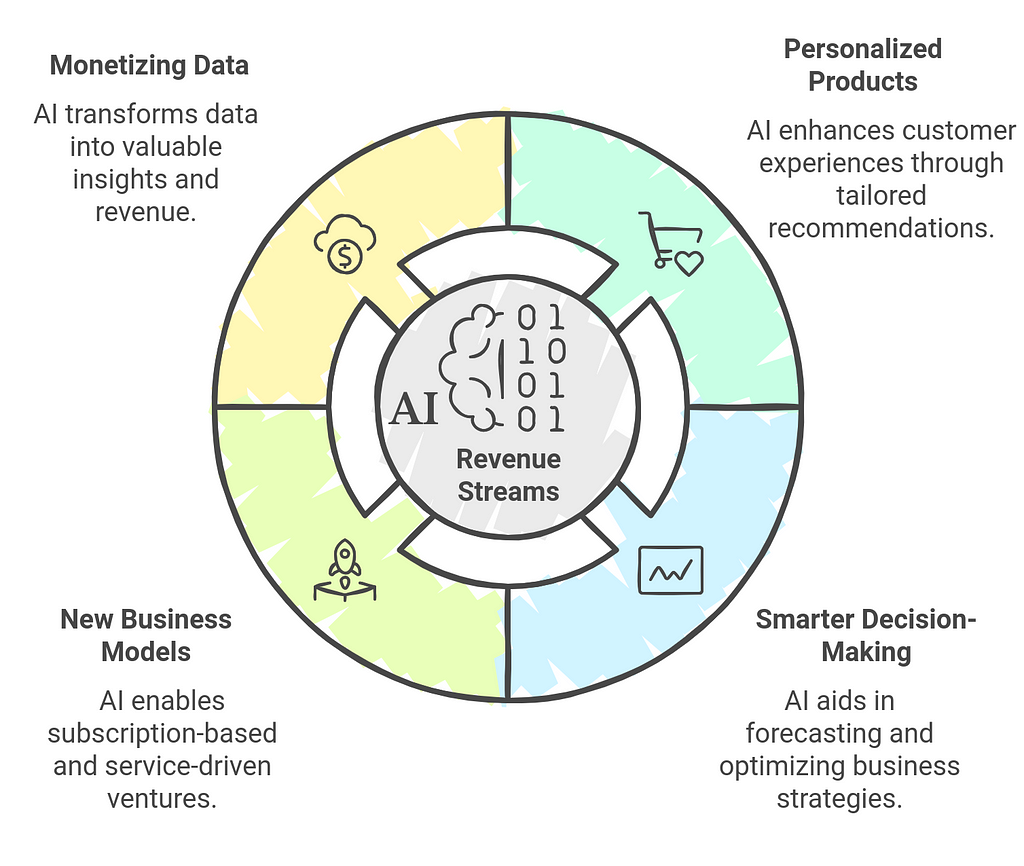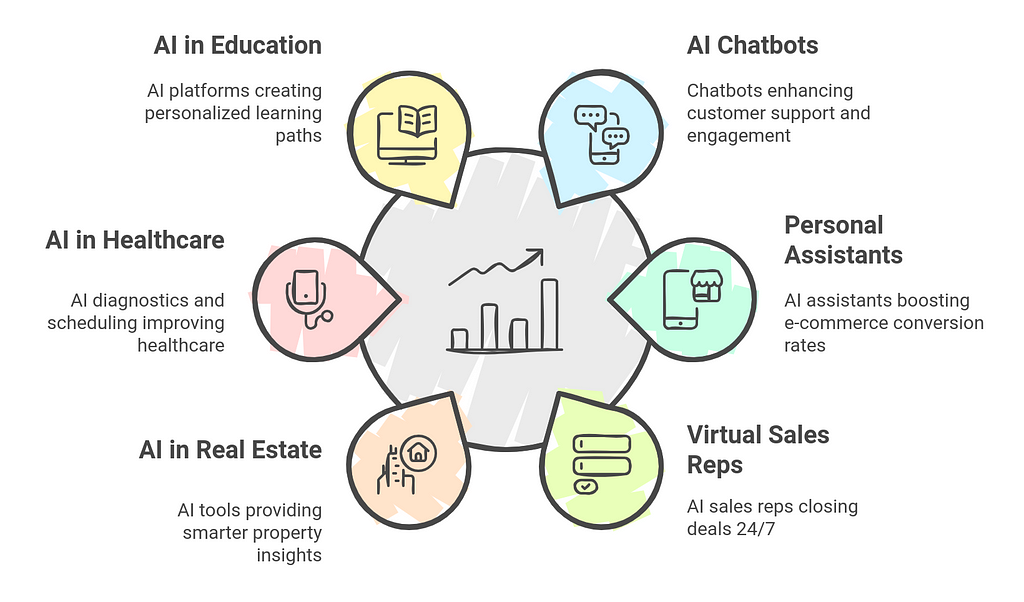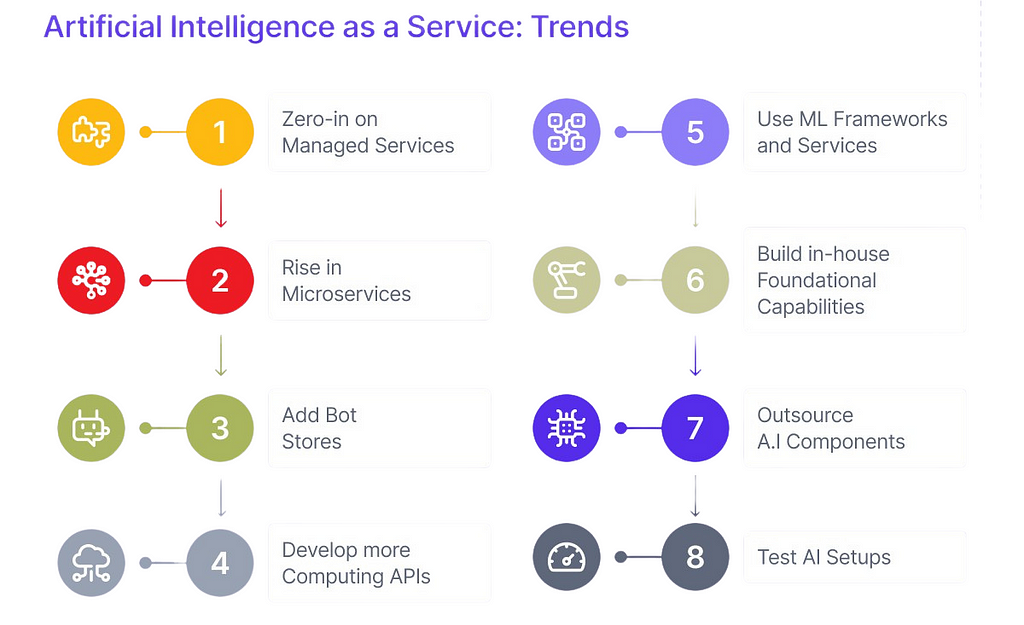Ai-powered Business Ideas Every Entrepreneur Should Explore In 2025

Artificial intelligence has become a cornerstone of modern business, transforming industries and driving unprecedented growth. In 2023, the AI market was valued at a massive $142.3 billion and is projected to skyrocket to $1.8 trillion by 2030. This exponential growth is a testament to AI’s potential to innovate, optimize, and create new opportunities for businesses of all sizes. For entrepreneurs, AI isn’t just an option anymore — it’s a game-changer that can set the foundation for success. Let’s explore why AI is the ultimate enabler for business growth and innovation.
The Rise of AI in the Entrepreneurial Ecosystem
AI isn’t just for tech giants anymore. It’s the secret weapon leveling the playing field for startups and solopreneurs. Today, AI is being used for everything from automating mundane tasks (hello, chatbots!) to forecasting trends with pinpoint accuracy. It’s like having a super-smart business partner who never sleeps. Let’s see some pros and cons of using AI as a business idea in your entrepreneurial journey.

What’s fueling this AI boom? Access and affordability. Platforms like OpenAI, Google AI, and Microsoft Azure have made AI tools and APIs more accessible than ever. No PhD in machine learning? No problem! Entrepreneurs can now leverage no-code and low-code AI platforms to build custom solutions for their unique business needs.
Plus, AI isn’t bound by industry. Whether it’s retail, healthcare, education, or finance, the AI wave is sweeping across sectors. And the best part? The adoption rate is climbing faster than you can say “machine learning.” According to McKinsey, 56% of companies now report using AI in at least one function of their business. For entrepreneurs, this means opportunities are everywhere.
How AI Unlocks New Revenue Streams for Startups?
AI is like a goldmine for entrepreneurs — it’s all about knowing where to dig. Here’s how it can open up revenue streams you might not have thought of:

1. Personalized Products and Services
Ever notice how Netflix always seems to know what you want to watch? That’s AI at work. Entrepreneurs can use similar recommendation algorithms to upsell products, create personalized experiences, and keep customers coming back for more.
2. Smarter Decision-Making
Running a business is full of guesswork — until AI steps in. Tools like predictive analytics can help entrepreneurs forecast sales, optimize pricing, and even predict inventory needs. It’s like having a crystal ball for your business.
3. New Business Models
AI can transform traditional business models into subscription-based or service-driven ventures. For example, instead of selling software outright, entrepreneurs can develop AI tools and offer them as Software-as-a-Service (SaaS). Think AI-powered tools for content creation, customer analytics, or workflow automation.
4. Monetizing Data
Every business generates data, but few know how to monetize it. AI tools can help entrepreneurs analyze customer data, derive insights, and even sell anonymized data to other businesses looking for market insights.
Why Every Entrepreneur Should Consider AI for Growth?
Let’s face it: staying competitive means staying ahead. AI isn’t just a fancy add-on — it’s becoming the backbone of modern business strategies. Here’s why it’s a game-changer:
1. Automation is King
Time is money, and AI gives you more of both. By automating repetitive tasks — like customer support or invoice processing — you can free up resources to focus on growth.
2. Customer Expectations are Skyrocketing
Customers today expect 24/7 support, lightning-fast service, and personalization at every touchpoint. AI lets you deliver all this and more without breaking a sweat — or the bank.
3. Scaling Without Limits
AI grows with you. Whether you’re handling ten customers or ten thousand, AI tools can scale effortlessly, adapting to the changing needs of your business.
4. Affordable Innovation
Contrary to popular belief, AI doesn’t have to burn a hole in your pocket. With open-source tools, affordable APIs, and cloud-based solutions, you can implement AI without massive upfront costs.
AI-Powered Business Opportunities
AI is no longer a futuristic concept — it’s here, reshaping industries and creating exciting opportunities for entrepreneurs. Let’s explore how AI is revolutionizing customer experience, redefining traditional sectors, streamlining operations, and building niche tools that open new doors for business success.

- Transforming Customer Experience with AI
Customer experience is the lifeblood of any business, and AI takes it to the next level. Here’s how:
Building Chatbots That Go Beyond Customer Support
Gone are the days of rigid, pre-programmed chatbots. Modern AI chatbots like those powered by GPT can hold natural conversations, resolve complex queries, and even handle tasks like booking appointments or recommending products. Businesses that deploy these bots not only save on costs but also deliver 24/7 support, keeping customers happy and engaged.
AI-Powered Personal Shopping Assistants for E-commerce
E-commerce giants like Amazon have set the standard for personalized shopping, and AI is the engine behind it. AI-powered personal assistants can analyze user preferences, suggest tailored product recommendations, and even predict future purchases. For smaller e-commerce businesses, implementing such tools can significantly boost conversion rates and customer loyalty.
Virtual AI Sales Reps: Closing Deals 24/7
Imagine having a sales team that never sleeps. Virtual AI sales reps can engage leads, answer questions, and guide prospects through the sales funnel at any hour. These tools can be programmed to upsell, cross-sell, or follow up automatically, ensuring no opportunity slips through the cracks.
2. Redefining Traditional Industries with AI
AI isn’t just for tech startups — it’s transforming traditional industries and making them more efficient, accurate, and customer-focused.
AI in Real Estate: Smarter Listings and Buyer Insights
Real estate is being revolutionized by AI tools that offer predictive market analysis, smarter property listings, and insights into buyer behavior. Platforms can now recommend properties based on user preferences and financial capability, making the house-hunting process seamless and efficient.
Revamping Healthcare with AI Diagnostics and Scheduling
AI-powered diagnostic tools are speeding up disease detection and reducing errors, while scheduling systems ensure doctors and patients are matched efficiently. For entrepreneurs in healthcare, AI presents endless opportunities — from telemedicine platforms to wearable health devices that provide real-time insights.
AI for Personalized Education Platforms
Education is no longer one-size-fits-all. AI-driven platforms are creating personalized learning paths for students, identifying strengths, and addressing weaknesses. Entrepreneurs can tap into this growing market by offering solutions like adaptive learning apps, virtual tutors, and AI-powered exam prep tools.
3. AI Solutions for Streamlining Operations
Streamlining business operations is critical to scaling effectively, and AI offers entrepreneurs tools to do just that.
AI-Driven Inventory Management Systems for Retail
Managing inventory is often a headache, but AI makes it smarter and simpler. AI tools can predict demand, optimize stock levels, and even suggest restocking schedules based on historical data and trends. Retailers can cut costs, reduce waste, and ensure products are always available.
Automated Marketing Campaigns: From Content to Execution
Marketing can be time-consuming, but AI tools like HubSpot and Jasper take the load off. These platforms can generate ad copy, segment audiences, and automate email campaigns with precision. Entrepreneurs can focus on strategy while AI handles execution, ensuring campaigns are both cost-effective and impactful.
Intelligent Fleet Management for Logistics Businesses
AI-powered fleet management systems optimize delivery routes, reduce fuel consumption, and monitor vehicle health in real time. Entrepreneurs in logistics can significantly improve efficiency, lower costs, and meet tight delivery deadlines with these intelligent tools.
4. Building Scalable AI Tools for Niche Markets
AI isn’t just for the masses — it’s opening doors in niche markets that are ripe for disruption.
AI-Powered Design Tools for Creatives and Small Businesses
Graphic designers and small businesses often need quick, affordable design solutions. AI tools like Canva and Adobe’s Sensei-powered features offer automated templates, image enhancements, and even content suggestions. Entrepreneurs can develop similar tools tailored to specific creative niches.
AI for Financial Advisors: Personalized Budgeting and Investment Tools
Finance is no longer reserved for the elite. AI-powered platforms can now offer personalized budgeting tips, investment advice, and expense tracking. Entrepreneurs can create tools that democratize financial planning, helping users achieve their goals without hiring a financial advisor.
Language Translation Tools That Bridge Global Markets
Language barriers are no match for AI. Tools like Google Translate have paved the way, but entrepreneurs can innovate further by offering industry-specific translation tools, voice-to-text solutions, or even AI interpreters for live conversations.
The “AI-as-a-Service” Revolution: Selling AI Solutions
In today’s fast-paced digital economy, businesses are hungry for AI solutions to streamline operations and gain a competitive edge. This demand has sparked the rise of AI-as-a-Service (AIaaS), where entrepreneurs create and sell AI solutions that are easy to integrate, scalable, and customizable.

Let’s break down how you can capitalize on this booming market by creating SaaS platforms and offering white-label AI products.
1. Creating AI SaaS Platforms for Subscription-Based Revenue
AI-powered Software-as-a-Service (SaaS) platforms are a goldmine for recurring revenue. By offering subscription-based services, entrepreneurs can attract a steady stream of customers while scaling their solutions to meet growing demands.
AI-Powered Analytics Tools for Small Businesses
Small businesses often struggle to make data-driven decisions due to a lack of expertise or resources. AI-powered analytics tools can bridge this gap by offering simple dashboards, trend analysis, and predictive insights. Entrepreneurs can create SaaS platforms that help small businesses forecast sales, identify customer preferences, or optimize marketing efforts — all without needing a full-fledged data science team.
AI-Enhanced Collaboration Platforms for Remote Teams
Remote work is here to stay, and collaboration platforms are evolving to meet the needs of distributed teams. Imagine AI tools that automatically summarize meetings, suggest action items, or even manage schedules. SaaS platforms like these can enhance productivity while reducing time spent on manual tasks, making them a must-have for businesses embracing remote work.
Subscription-Based AI Tools for Content Creators
Content creation can be a time sink, but AI tools are stepping in to lighten the load. Platforms like Jasper AI or Canva’s AI features already assist with generating text and visuals. Entrepreneurs can take this further by offering niche-specific tools, such as video editing AI for YouTubers or social media content generators tailored to specific industries. The subscription model ensures creators keep coming back for more, fueling steady revenue.
Offering White-Label AI Products to Enterprises
White-label AI products are a win-win for entrepreneurs and enterprises. Businesses get customizable solutions under their branding, while entrepreneurs earn by selling ready-made frameworks or tools.
How Entrepreneurs Can Monetize AI Frameworks
AI frameworks, such as pre-trained models for image recognition, natural language processing, or recommendation systems, are in high demand. Entrepreneurs can monetize these by offering licensing agreements or one-time purchase options. For instance, a retail chain might use a white-labeled recommendation engine to enhance its e-commerce platform, saving development time while meeting its unique needs.
Developing AI APIs for Integration Across Industries
APIs are the building blocks of modern software development, and AI-powered APIs take it a step further. Entrepreneurs can create APIs that integrate AI functionalities like sentiment analysis, facial recognition, or chatbot capabilities. These APIs can be marketed to industries ranging from healthcare to fintech, allowing businesses to plug in advanced AI features without building them from scratch. It’s like offering pre-packaged innovation on-demand.
Tapping Into AI Trends Entrepreneurs Shouldn’t Ignore
AI is not just about automation or predictive analysis anymore — it’s driving some of the most dynamic trends reshaping industries today. From empowering creators and fostering sustainability to redefining the gig economy, these trends present golden opportunities for entrepreneurs to innovate, lead, and grow. Let’s explore how these trends can inspire your next AI-powered business idea.
The Creator Economy: AI for Content Generation
The creator economy is booming, with influencers, bloggers, and digital marketers constantly seeking ways to scale their content game. AI tools are stepping up as their creative partners, making content generation faster, smarter, and more engaging.
AI Video Editors for Influencers and Brands
Video content is king, and influencers know it. AI-powered video editors like Pictory or Runway are simplifying the process, automating tasks like cutting clips, adding captions, and even suggesting transitions. Entrepreneurs can create specialized AI tools that cater to niches like travel vlogging, product reviews, or educational content. These tools not only save time but also ensure high-quality results, helping creators focus on their vision.
Content Writing Bots That Fuel Blogs and Social Media
AI writing tools like Jasper or Writesonic are already revolutionizing how bloggers and marketers create content. Imagine a bot that crafts SEO-optimized articles, catchy captions, or even entire eBooks in minutes. Entrepreneurs can develop tools that cater to specific content needs, such as AI-powered tweet generators for tech enthusiasts or blog assistants for food bloggers. The possibilities are endless, and the demand is massive.
Sustainability: AI’s Role in Eco-Friendly Businesses
Sustainability is not just a buzzword; it’s a business imperative. Entrepreneurs looking to align with green initiatives can tap into AI’s capabilities to build solutions that promote eco-conscious practices.
AI-Driven Carbon Footprint Trackers
Consumers and businesses alike are increasingly conscious of their carbon footprints. AI tools can help track and analyze emissions, offering actionable insights to reduce them. Entrepreneurs can create platforms that integrate with IoT devices, enabling businesses to monitor and optimize their environmental impact in real-time. Think of it as a Fitbit for carbon emissions.
Optimizing Energy Usage with Smart AI Systems
Energy efficiency is another area where AI shines. From smart thermostats that learn usage patterns to industrial AI systems that optimize energy consumption, the opportunities are vast. Entrepreneurs can develop solutions for both residential and commercial use, helping users save on energy costs while reducing their environmental impact. This not only meets the demand for sustainability but also creates cost-saving benefits — an attractive selling point.
The AI-Powered Gig Economy
The gig economy is evolving, and AI is playing a critical role in empowering freelancers and small businesses. Whether it’s providing virtual support or enhancing individual productivity, AI is creating tools that redefine how we work.
Virtual AI Assistants for Small Businesses and Startups
Small businesses often operate with limited resources, and that’s where virtual AI assistants come in. These tools can handle administrative tasks like scheduling, email management, or customer queries, acting as an affordable alternative to hiring full-time staff. Entrepreneurs can create customizable AI assistants tailored to specific industries, like a legal assistant for lawyers or an inventory manager for retailers.
AI Tools That Empower Freelancers to Scale Their Services
Freelancers often juggle multiple clients and projects, which can be overwhelming. AI tools can help streamline their workflow by automating invoice generation, tracking time, or even providing insights into project profitability. For instance, a graphic designer could use an AI tool that offers design suggestions or automates repetitive tasks like resizing images. Entrepreneurs can build niche AI tools that cater to these specific freelance needs, helping individuals scale their businesses efficiently.
Case Studies: Entrepreneurs Harnessing AI for Business Success
AI is transforming industries, and savvy entrepreneurs are leveraging its power to drive innovation and growth. Let’s delve into some inspiring success stories that highlight how AI can be a game-changer for your business.
1. Must Have Ideas: Revolutionizing Home Shopping with AI
Founded in 2018 with just £3,000, Must Have Ideas is an online retailer specializing in cleaning and homeware products. By 2024, the company achieved sales of £40 million. Seeking to expand into TV shopping without incurring high broadcast costs, they launched the first AI-driven TV shopping channel on Sky in September 2024. Their proprietary software, Spark, delivers 24/7 AI-directed programming, automating content scheduling based on stock levels and external factors. This innovative approach significantly reduced operational costs and boosted sales, attracting a loyal customer base.
2. Bob Knakal’s BKREA: AI in Real Estate
Bob Knakal, a veteran in commercial real estate, launched BKREA to integrate AI into property sales. By leveraging AI, his firm analyzes extensive property data to gain a competitive edge over larger companies. Despite industry challenges, Knakal’s AI-driven approach has already secured $2 billion in property sales, demonstrating AI’s potential to revitalize traditional industries.
3. Neural Frames: AI in Creative Media
Physicist-turned-entrepreneur Nicolai Klemke founded Neural Frames, an AI-driven tool that creates unique visual content. Within months of its launch, the platform attracted 130,000 visitors and achieved a monthly recurring revenue of $17,000, showcasing how AI can open new revenue streams in creative industries.
Making AI Work for Your Business Idea
Integrating AI into your business can seem daunting, but with a strategic approach, it becomes a powerful ally. Here’s how to get started:
Identifying the Right Problem AI Can Solve for Your Market
Begin by pinpointing challenges within your industry that AI can address. Is it automating repetitive tasks, enhancing customer experiences, or providing data-driven insights? Understanding your market’s pain points will guide you in selecting the most effective AI solutions.
How to Access AI Tools Without Breaking the Bank
Worried about costs? Many affordable AI tools are available for startups and small businesses. Open-source platforms and cloud-based services offer robust AI capabilities without hefty price tags. For instance, tools like Freepik’s AI Image Generator provide versatile solutions for visual content creation, making AI accessible even on a tight budget.
Partnering with AI Developers to Fast-Track Your Vision
Collaborating with experienced AI developers can accelerate your project’s development and implementation. Whether hiring talent or partnering with specialized firms, their expertise can help tailor AI solutions to your specific business needs, ensuring a smoother integration process.
Conclusion
Embracing AI opens a world of opportunities for entrepreneurs, from enhancing operational efficiency to creating innovative products and services. By learning from successful case studies and strategically implementing AI solutions, you can position your business at the forefront of your industry, ready to meet the evolving demands of the market.

This story is published on Generative AI. Connect with us on LinkedIn and follow Zeniteq to stay in the loop with the latest AI stories.
Subscribe to our newsletter and YouTube channel to stay updated with the latest news and updates on generative AI. Let’s shape the future of AI together!

AI-Powered Business Ideas Every Entrepreneur Should Explore in 2025 was originally published in Generative AI on Medium, where people are continuing the conversation by highlighting and responding to this story.


